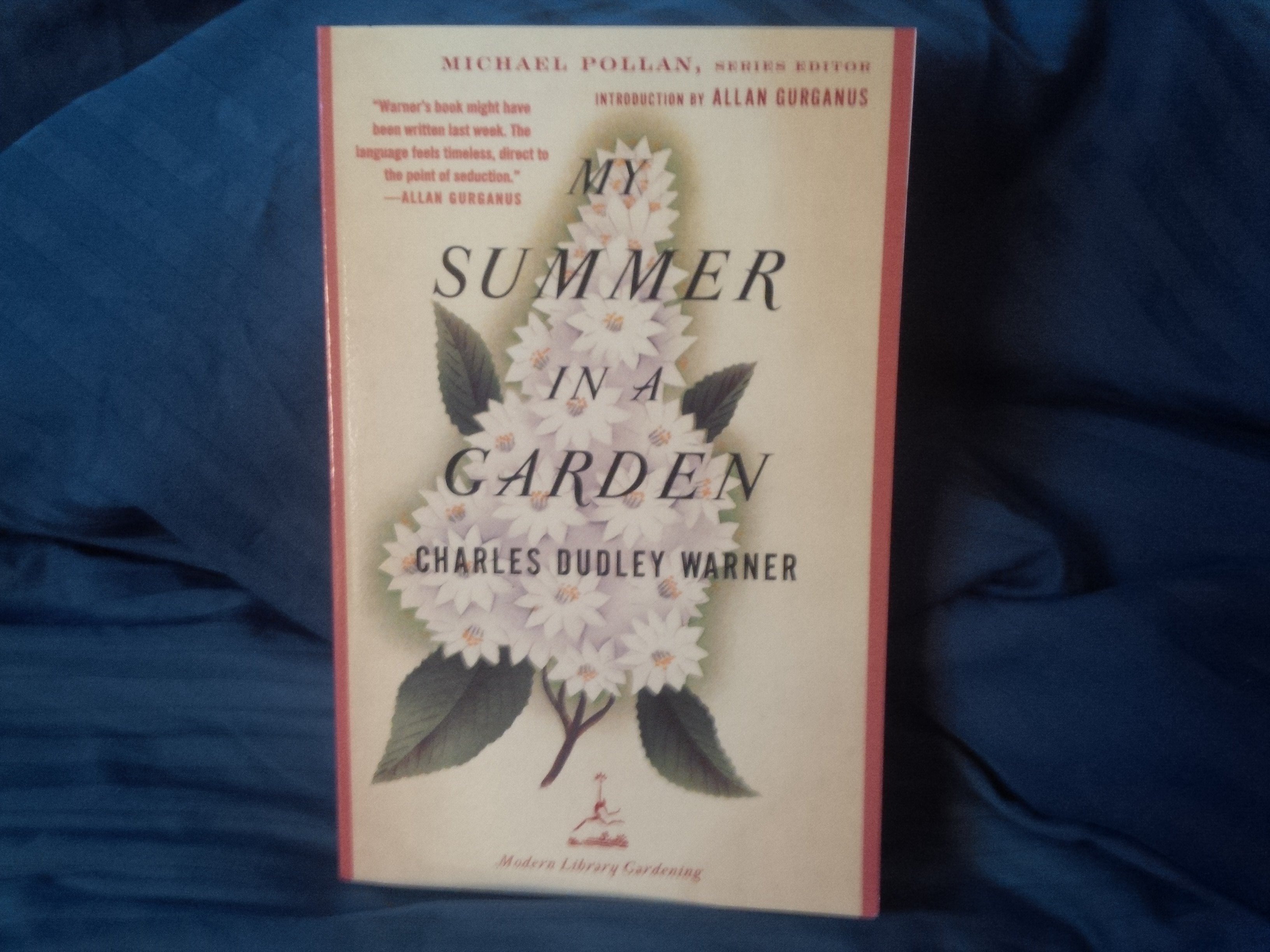Pity poor Charles Dudley Warner. Born in 1829, he was a lawyer, newspaper editor/ publisher, prolific writer, confidant of numerous famous people and dedicated amateur gardener. Despite that impressive resume, he is best remembered; when he is remembered at all, as a close friend of Mark Twain. So close, in fact, that a phrase coined by Warner—“Everybody complains about the weather, but nobody does anything about it.”—was appropriated by Twain and is almost universally attributed to him.
Weather is among the topics discussed in Warner’s one and only gardening book, My Summer in a Garden, published in 1870 and reissued in 2002 by Random House as part of its Modern Library Gardening series, edited by Michael Pollan. The new edition boasts a twenty-six page introduction by author Allan Gurganus that serves to pad out Warner’s rather slim, one hundred-page volume of wonderful writing. I skipped Gurganus and opened right to Warner, taking in the introduction after finishing the body of the book.
My Summer in a Garden is divided into nineteen chapters, one for each week in the growing season. Warner starts, as all gardeners do, with dirt and sings the praises of digging and hoeing in it. “There is life in the ground;” he says, “it goes into the seeds; and it also, when it is stirred up, goes into the man who stirs it.” He does not separate ornamental and edible gardening, though the book leans towards edibles. The real harvest, though, is a delightful basket of horticultural wisdom, plus sly commentary on history, politics, science, art and literature.
Weeds and hoeing are a recurrent theme, from the time plants go into the ground until the harvest comes in. Warner puts the existence of weeds—the worst of which he often refers to as “pusley”–in the same theological category as Original Sin, inviting a couple of clergyman acquaintances to hoe his garden in exchange for permission to make that allusion in their sermons. He is dismayed when they decline. The author/gardener clearly likes sleep, good breakfasts and moderation in all things, including gardening. He admits, however, that the garden’s needs may win out over all of them. Worrying about bugs on his tomato plants, he observes, “You can’t get up too early, if you have a garden.”
One of the best and funniest essays in the book describes the Eighth Week, when the garden is visited by a “High Official Person”. The person is President Ulysses Grant, who gets a guided tour of the landscape. Grant praised the garden generously, interspersing his observations with comments on geopolitical issues. Those who think crass commercialism is a modern affliction can take comfort in Warner’s satirical aside, “That corn and those potatoes which General Grant looked at, I will sell…at five dollars an ear, and one dollar a potato. Office-seekers need not apply.”
Warner takes pleasure in cultivating the earth even when summer temperatures soar, suffering the heat while he celebrates the sights and sounds around him. He digresses into the extreme fulfillment he finds in the company of his cat, Calvin, who is, apparently a paragon of feline virtue. Given that Calvin was formerly owned by author Harriet Beecher Stowe of Uncle Tom’s Cabin, fame, Calvin’s virtue is no surprise.
Just about the only garden-related activity that Warner does not like is applying fertilizer, to which he grudgingly devotes only one page. He recommends leaving fertilizer application to others, adding, “It is much pleasanter and easier to fertilize with a pen, as the agricultural writers do, than with a fork.”
Despite the cameo appearances by luminaries of Warner’s time like President Grant and Horace Greeley, most of his observations are timeless and some could have been written yesterday. He takes on the modern concepts of profit and value in the Sixteenth Week, discussing whether or not gardening “pays” and toting up the cost of raising potatoes on his property. According to his figures, the potatoes do “pay”, but only if the gardener’s labor is not added into the expense column. Warner’s take on this subject reminds me of another very funny contemporary book, William Alexander’s The $64.00 Tomato.
By the end of the growing season, in the Nineteenth Week, Warner is, like most gardeners, tired. Unlike many of us, he puts tiredness aside and tidies up his beds, the better to spend a peaceful winter.
Warner succeeds in “fertilizing with a pen,” and does it so well that it surprises me that My Summer in a Garden” was out of print for over a century. Thank goodness you can still buy copies new or used, from major booksellers.
Our times are as turbulent as Warner’s and gardening is, as it always has been, a good antidote to that turbulence. As you ready your beds for winter, think of Warner’s words—“The man who has planted a garden feels that he has done something good for the world.”

